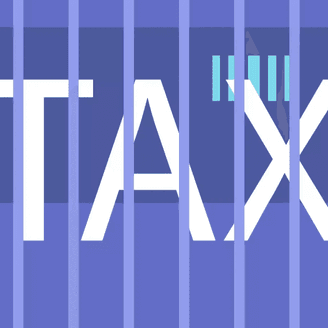- Osome Blog HK
- A Guide to Tax Evasion Penalties
What Happens When You Avoid Tax in Hong Kong? A Guide to Tax Evasion Penalties
- Modified: 17 November 2025
- 7 min read
- Accounting & Bookkeeping, Taxes & Compliance


Lim Wan Er
Author
Lim Wan Er brings creativity, curiosity, and a love of storytelling to her writing. A devoted foodie, she enjoys iced lattes and soggy fries, and takes at least one solo vacation each year to discover local cuisine. Her experiences inform content that is fresh, relatable, and engaging, allowing Hong Kong readers to connect with stories full of character, while celebrating cultural experiences and everyday pleasures.
Hong Kong is well-known for its simple and straightforward tax regime. For one, its corporate tax system follows a flat-rate and territorial regime, which makes the country one of the best places you could start a business in. However, despite the favorable tax rates, there are still cases of tax evasion which leads to legal consequences.
It is never a good idea to evade tax. If you are looking for ways to minimise your tax, our experienced accounting team can help with that and still make sure your company stays compliant.
Hong Kong’s Tax Regime
Tax rates
In Hong Kong, there are two tax rates applicable to corporations.
Single-tier tax rate
Incorporated businesses: 16.5%
Unincorporated businesses: 15%
Two-tier tax rate
Incorporated businesses:
- 8.25% on assessable profits up to HK$ 2,000,000
- 16.5% on any part of assessable profits over HK$ 2,000,000
Unincorporated businesses:
- 7.5% on assessable profits up to HK$ 2,000,000
- 15% on any part of assessable profits over HK$ 2,000,000
For more detailed information on the two-tier tax rate, check out more FAQs here.
Of course, we understand that profit tax can be confusing especially for first-time business owners and new entrepreneurs. Not to fret though, we answer your questions through this guide to profit tax return and all the documents you need to file your tax.
Do I have to pay Corporate Tax if I am a non-resident?
As mentioned above, Hong Kong follows a territorial tax regime. What this means is that it does not matter if you are a resident or non-resident, you will need to pay corporate tax on all profits (excluding profits from the sale of capital assets). This applies to both individuals and business corporations deriving income in Hong Kong.
Example
Catherine is not a Hong Kong resident. Nonetheless, she has decided to start her baking business in Hong Kong. She has both a retail and online shop to sell her bakes and merchandise. Is Catherine liable to profits tax? Yes she is, as her income and profits are gained in Hong Kong.
Example
Jonathan is a Hong Kong resident who has started a business in Hong Kong. However, he does not gain income from Hong Kong, but from the United States. He is therefore eligible to claim an exemption from profits tax, as his income is not derived from Hong Kong.
What Activities Count As Tax Evasion?
First things first, before we dive into evading tax, you should be aware of the kinds of tax you may be liable for when starting a business in Hong Kong.
Some common activities that count as tax evasion for companies include but are not limited to:
- Fabrication of the amount of income made by your company in the financial year
- Reporting expenses that you did not make in order to report a lower assessable income
- Failing to inform IRD of the company’s chargeability to the profits tax
- Intentionally omitting remuneration details of employees
- Overstating the company’s expenses
Here’s why you should avoid evading tax
As a business owner, finding ways to lower your tax is understandable. It helps reduce your assessable taxable income, and therefore allows you to maximise your profits. It is a good practice to reduce your tax obligation, but at what expense?
While tax avoidance can knowledgeably relieve you from making huge tax payments, tax evasion can potentially land you in jail.
What entrepreneurs should be careful of
Business owners and entrepreneurs have more control over the company’s accounting works, such as its balance sheets and accounts, and are also responsible for tax reporting. Checks should be done with a reliable accountant to ensure that no discrepancies in the company’s annual tax filings.
As such, tax law authorities in each jurisdiction tend to place business owners under stricter scrutiny as compared to individuals who are working for the company as employees.
There are some ways entrepreneurs sometimes evade tax:
- Purposely concealing their actual earnings
- Engaging in accounting regularities
- Taking part fraudulently mislabeling a transaction, and more
What’s the Difference Between Tax Avoidance and Tax Evasion?
Tax avoidance must not be confused with tax evasion.
Tax avoidance uses perfectly legal accounting measures in order to reduce the amount of tax your company has to pay. Tax evasion on the other hand, is avoiding tax payments intentionally and on purpose. Evading tax can and will lead you to penalties, fines and even a jail sentence.
As with all matters, it is not right to exploit the tax laws when starting a business in that jurisdiction.
This points us to the importance of having your company’s accounting in professional hands. If you find yourself with no time to handle those financial statements and deadlines, we have a team of highly adept accountants that can help with all the paperwork and experienced company secretaries in Hong Kong to help your company stay compliant.
What Are the Penalties for Evading Tax?
The Inland Revenue Ordinance (IRO) has requirements to ensure all companies are filing their tax and returns accurately and timely. These include keeping and retention of financial records, applying due diligence procedures for financial account information etc.
When these requirements are somehow not complied with, the Commissioner of the IRO can, at his discretion, institute prosecution or make the offender pay the additional tax on top of a penalty.
This severity of the penalty is subjected to:
- The nature of the offence
- The degree of liability of the offence
- The strength of evidence presented
- The amount of undercharged / underreported tax
- The seriousness of the offence
- How long was the offence committed
What Kind of Penalties Could You Face?
As mentioned above, the final outcome of your penalty if you are found evading tax is subjected to certain requirements and at the discretion of the Commissioner. We list down some more commonly seen tax evasion penalties below.
You can be subjected to a fine of HK$ 10,000 and be required to make the payment within a certain timeframe if you, without a reasonable excuse:
- Fail to comply with the record-keeping requirement of rent records
- Make an incorrect return
- Make an incorrect statement for deduction or allowance claims
- Give incorrect information to anyone’s liability to tax
- Fail to notify authorities about a premium refund after claiming tax deduction
- Fail to file a return in time
- Fail to inform liability to tax
Here’s what you can do to avoid these penalties:<br>
- Keep a strict eye on your accountant
- Do not give false information about your employee’s tax
- When in doubt, ask said employee to check with the tax authorities him/herself
- After you have claimed a tax deduction for whatever reason, you must always inform the tax authorities if there was a refund you received
- Always make sure you do not delay your tax filings
- Submit your tax returns on time
- Make sure all your income statements are clearly stated
What can you do to avoid this penalty? Ensure your bookkeeping is in good hands, all statements of every profit and expense should be clearly recorded.
You can be subjected to a fine of HK$ 50,000 and be required to make the payment within a certain timeframe if you, without a reasonable excuse:
- Intentionally evade or assist any person to evade tax
- Fail to include any sum into your tax return
- Give false information in any return
- Prepare or maintain any wrong accounting books or records
- Make use of fraud methods to avoid paying tax
The fine of three times the tax undercharged can add up to a hefty sum, even more than what you originally had to pay. Plus, imprisonment is no laughing matter, it could cease any plans to expand or grow your business.
When Will You Be Punished for Tax Evasion?
There are times when we are bound to make mistakes. Thus, the IRD also includes a portion for offences that do not involve any willful intent to evade tax, meaning you did not have any intentions to purposely avoid tax.
What happens if you accidentally file a wrong tax return then?
If you did not evade tax on purpose, it will be handled administratively under the Profits Tax category in the form of additional tax. As such, a field audit or investigation might be conducted, which will determine your result. If you fall within this group, you will be advised accordingly to how much extra tax you need to make up for, and the relevant additional tax assessments.
Common cases that can happen include unintentional or accidental:
- Omission or understatement of income or profit gains
- Making a wrong statement for a deduction or allowance claim
- Failure to notify about liability to pay tax
For more information, head on to section D of the IRD guide.
This example is based on a true incident:
- Two company directors were charged for willfully and intentionally assisting a company to evade profits tax.
- The directors were the shareholder and director for a property company and reported the company’s assessable profits as $253,425.
- However, after a check by the IRD, the directors included a “computer and internet expense” for $99,700 and "salaries and commission expenses" of $99,300.
- By doing so, the company’s assessable income was reduced by $199,000.
- The tax evaded was $34,826.
- Both directors were convicted for tax evasion and sentenced to six weeks imprisonment.
To make your life simpler so that you can focus on your business, your accounting and bookkeeping measures must be strictly followed. At Osome, we have different monthly plans to suit your revenue, so there’s no need to worry about huge accounting expenses. We do company registration and incorporation, accounting for ecommerce and even company secretary services as well, so you’re covered on all you need to start and grow your business. Drop us a chat any time to find out how we can help you.







